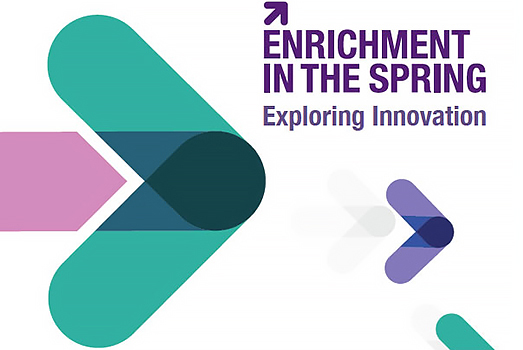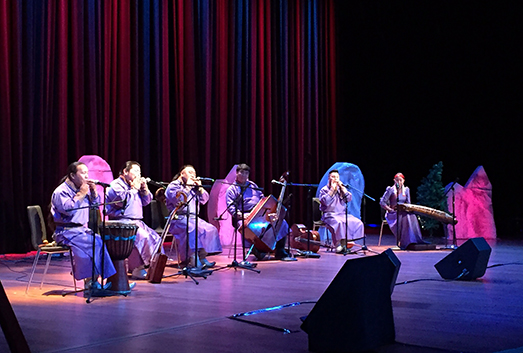Enrichment in the Spring is just around the corner

KAUST will welcome the springtime months of the year by hosting its second annual Enrichment in the Spring Program from April 22 to 30.
The KAUST community is invited to “Explore Innovation” during the one-week inspiring journey featuring a diverse range of events, lectures and seminars, including a jazz festival on April 22 to 23; a photography competition and exhibition in collaboration with the KAUST Photography Self-Directed Group; World Intellectual Property Day celebration on April 26 and 27 in collaboration with the King Abdulaziz City for Science and Technology (KACST) and the Saudi Patent Office (SPO); and a keynote lecture by Thomas Skalak, executive director, science and technology, from the Paul G. Allen Family Foundation.
Enrichment in the Spring is made possible with support from Innovation & Economic Development, Graduate Affairs, the Office of the Arts, the Islamic Development Bank and KACST.

Featuring a performance by Khusugtun, a group of traditional throat singers from Mongolia, the gala also included an awards ceremony for different competitions that took place during WEP.
With a focus on sustainability and climate change for 2016, the University’s seventh WEP “included all sorts of activities aimed to broaden the experiences of us all and to enrich us all,” said Mark Tester, professor of plant science and chair of the 2016 program.
“This evening we end with Mongolian music—the arts are a key part of our lives and our cultures,” he continued. “Our scientific discoveries, applications, spinout companies and publications are wonderful for KAUST and for a wider academic community, but they are of little point if we don’t use the advances we make to support the arts and culture and enrichment.”
Marie-Laure Boulot, manager of enrichment programs, noted “WEP’s main goal is to enrich and inspire. The 2016 program featured many challenges and competitions of discovery, creativity and curiosity. Tonight we reward those who took part in them.”
International Undergraduate Research Poster Competition
This year’s WEP International Undergraduate Research Poster Competition received over 600 applications from around the world. Fifty finalists were selected to take part in the on-campus competition. Three winners were selected from the 50 finalists.
“The International Undergraduate Research Poster Competition is an opportunity to showcase students from across the globe, sharing the results of their research and hard work with faculty, visitors and the KAUST community,” said Can Ikram, KAUST director of admissions and enrollment. “Our judging committee is carefully selected from faculty members from all [KAUST] divisions, and judging is based on quality, completeness, impact of the work and the visual clarity of the posters. The best work is recognized at the Awards Ceremony.”
Third place: Alanoud Albaiz, Abeer Alissa and Shaden Alhedaithy
(Al-Faisal University, Saudi Arabia)
“Urgent Care System”
Second place: Katherine Miller
(Richard Stockton College of New Jersey, U.S.)
“Time-Resolving Unimer Exchange in Block Copolymer Micelles”
First place: Maike Brand
(Universiteit Twente, the Netherlands)
“Recognition of Metal Cations with Surface Immobilized Crown Ether functionalized
Ply (ferrocensylsilane)”
A special judging session about climate change and sustainability, the themes of this year’s program, was led by Professor of Earth Science and Engineering Georgiy Stenchikovand speakers from the WEP symposium “The Real Science behind Climate Change.”
“Selective Molecular Exclusion of Branched Paraffins using MOFs Paving the Way to More Energy Efficient Hydrocarbons Separation”
Second place: Evgeniya Predybaylo (Atmospheric Physics and Climate Modeling Group)
“Volcanic Impact on Tropical Pacific Climate”
First place: Nouf Aljabri (KAUST Catalysis Center)
“Synthesis of novel catalysts for degradation of polymeric hydrocarbons”
“Metalloorganic Catalytic Conversion of Carbon Dioxide into Methanol”
Second place: Alexander Ukhov (Atmospheric Physics and Climate Modeling Group)
“Computational model based on coupling of CFD and particle codes to describe dust transport and deposition in the atmosphere”
First place: Michael J. Kelly (KAUST Catalysis Center—Surface Organometallic Chemistry Laboratory)
“Mitigation of global warming: Using CO2 as a feedstock via well-defined surface catalysis”
Sonia Negrao, Mariam Awlia, Arne Scheu, Noha Saber and Magdalena Julkowska; Salt Lab –supervisor: Mark Tester
The KAUST School (TKS) Secondary Category: "Is increasing the amount of coil more efficient than changing the voltage?"
Hannan Mohiuddin and Alejandro Whitehair-Duarte
TKS Primary Category: "Solar Powered Thermal Desalination"
Hamza Mohammed-Grade
“I think this year’s WEP, with its themes of sustainability and climate change, was one of the most focused, structured and successful programs we have had,” said Tester. “It has shown us that we need to increase the sustainability of our activities and increase our efforts to understand, mitigate and manage climate change.
“With our over 100 events and 50 international speakers on campus for WEP 2016, we should feel fortunate to be in a university where enrichment and the arts are so strongly supported.”
KAUST will welcome the springtime months of the year by hosting its second annual Enrichment in the Spring Program from April 22 to 30.
The KAUST community is invited to “Explore Innovation” during the one-week inspiring journey featuring a diverse range of events, lectures and seminars, including a jazz festival on April 22 to 23; a photography competition and exhibition in collaboration with the KAUST Photography Self-Directed Group; World Intellectual Property Day celebration on April 26 and 27 in collaboration with the King Abdulaziz City for Science and Technology (KACST) and the Saudi Patent Office (SPO); and a keynote lecture by Thomas Skalak, executive director, science and technology, from the Paul G. Allen Family Foundation.
Enrichment in the Spring is made possible with support from Innovation & Economic Development, Graduate Affairs, the Office of the Arts, the Islamic Development Bank and KACST.

Members of the Mongolian folk group, Khusugtun, perform in their traditional throat-singing style.
WEP gala event
The KAUST community was treated to an evening gala to celebrate the conclusion of the University’s 2016 Winter Enrichment Program (WEP) on January 21. WEP is part of the University’s three annual enrichment programs that also include Enrichment in the Spring and Enrichment in the Fall.Featuring a performance by Khusugtun, a group of traditional throat singers from Mongolia, the gala also included an awards ceremony for different competitions that took place during WEP.
With a focus on sustainability and climate change for 2016, the University’s seventh WEP “included all sorts of activities aimed to broaden the experiences of us all and to enrich us all,” said Mark Tester, professor of plant science and chair of the 2016 program.
“This evening we end with Mongolian music—the arts are a key part of our lives and our cultures,” he continued. “Our scientific discoveries, applications, spinout companies and publications are wonderful for KAUST and for a wider academic community, but they are of little point if we don’t use the advances we make to support the arts and culture and enrichment.”
Marie-Laure Boulot, manager of enrichment programs, noted “WEP’s main goal is to enrich and inspire. The 2016 program featured many challenges and competitions of discovery, creativity and curiosity. Tonight we reward those who took part in them.”
International Undergraduate Research Poster Competition
This year’s WEP International Undergraduate Research Poster Competition received over 600 applications from around the world. Fifty finalists were selected to take part in the on-campus competition. Three winners were selected from the 50 finalists.
“The International Undergraduate Research Poster Competition is an opportunity to showcase students from across the globe, sharing the results of their research and hard work with faculty, visitors and the KAUST community,” said Can Ikram, KAUST director of admissions and enrollment. “Our judging committee is carefully selected from faculty members from all [KAUST] divisions, and judging is based on quality, completeness, impact of the work and the visual clarity of the posters. The best work is recognized at the Awards Ceremony.”
Third place: Alanoud Albaiz, Abeer Alissa and Shaden Alhedaithy
(Al-Faisal University, Saudi Arabia)
“Urgent Care System”
Second place: Katherine Miller
(Richard Stockton College of New Jersey, U.S.)
“Time-Resolving Unimer Exchange in Block Copolymer Micelles”
First place: Maike Brand
(Universiteit Twente, the Netherlands)
“Recognition of Metal Cations with Surface Immobilized Crown Ether functionalized
Ply (ferrocensylsilane)”
KAUST Graduate Student/Postdoctoral Fellow Poster Competition
Fifty-nine KAUST graduate students and postdoctoral fellows participated in the WEP 2016 Graduate Student/Postdoctoral Fellow Poster Competition.A special judging session about climate change and sustainability, the themes of this year’s program, was led by Professor of Earth Science and Engineering Georgiy Stenchikovand speakers from the WEP symposium “The Real Science behind Climate Change.”
Graduate student winners
Third place: Ayalew Assen (Functional Materials Design, Discovery and Development Group)“Selective Molecular Exclusion of Branched Paraffins using MOFs Paving the Way to More Energy Efficient Hydrocarbons Separation”
Second place: Evgeniya Predybaylo (Atmospheric Physics and Climate Modeling Group)
“Volcanic Impact on Tropical Pacific Climate”
First place: Nouf Aljabri (KAUST Catalysis Center)
“Synthesis of novel catalysts for degradation of polymeric hydrocarbons”
Postdoctoral fellow winners
Third place: Huaifeng Li (KAUST Catalysis Center)“Metalloorganic Catalytic Conversion of Carbon Dioxide into Methanol”
Second place: Alexander Ukhov (Atmospheric Physics and Climate Modeling Group)
“Computational model based on coupling of CFD and particle codes to describe dust transport and deposition in the atmosphere”
First place: Michael J. Kelly (KAUST Catalysis Center—Surface Organometallic Chemistry Laboratory)
“Mitigation of global warming: Using CO2 as a feedstock via well-defined surface catalysis”
Other competition winners honored
The evening’s festivities also honored winners in different categories from the WEP 2016 Science Fair; the best movie from the WEP Lab 2 Film exhibition; the best Science Fair experiment or exhibition; winners from the Discover Saudi Arabia art competition; and the winners from the Science Fair robot-racing competition that was part of the WEP 2016 “Design and Build Your Own Robot” workshop.Science Fair winners
KAUST Research Category: "Salt Stress in Plants"Sonia Negrao, Mariam Awlia, Arne Scheu, Noha Saber and Magdalena Julkowska; Salt Lab –supervisor: Mark Tester
The KAUST School (TKS) Secondary Category: "Is increasing the amount of coil more efficient than changing the voltage?"
Hannan Mohiuddin and Alejandro Whitehair-Duarte
TKS Primary Category: "Solar Powered Thermal Desalination"
Hamza Mohammed-Grade
A successful 2016 program
“I think this year’s WEP, with its themes of sustainability and climate change, was one of the most focused, structured and successful programs we have had,” said Tester. “It has shown us that we need to increase the sustainability of our activities and increase our efforts to understand, mitigate and manage climate change.“With our over 100 events and 50 international speakers on campus for WEP 2016, we should feel fortunate to be in a university where enrichment and the arts are so strongly supported.”

